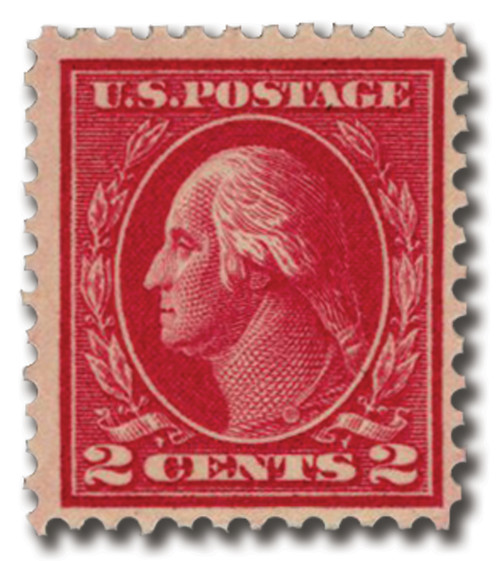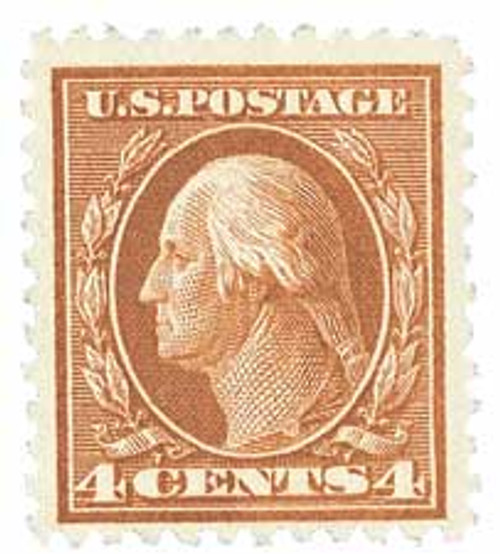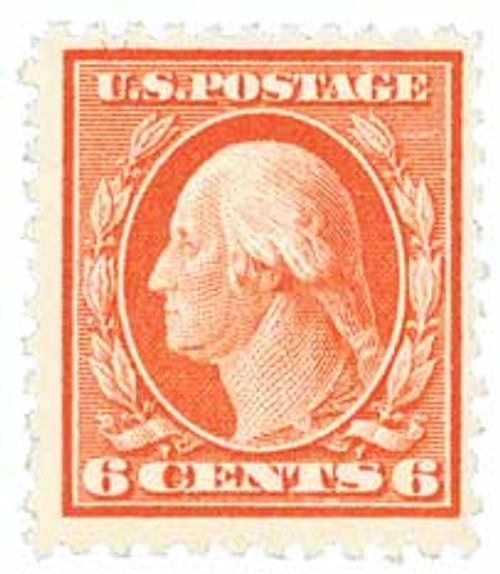
# 505 PB - 1917 5c Washington Error, red, perf 11
U.S. #505
1916-22 5¢ Washington
Error
U.S. #505 is a 5¢ stamp mistakenly printed with 2¢ stamps, meaning it received the wrong ink color (rose instead of blue). This scarce color error will make a neat addition to your collection. Read on to learn the story...
How did a 5¢ stamp find its way onto a 2¢ stamp sheet?
This story begins in 1917, during the height of World War I. An inspector at the Bureau of Engraving and Printing proofed a sheet printed by plate 7942 of the current 2¢ issue, Scott #499. Three of the impressions made by the plate were found to be unsatisfactory, and the inspector ordered them replaced.
To understand what happened next in the double error story, it’s important to know how these plates were produced. First a design is engraved on steel. Proofs are taken from this engraving. Once these proofs are approved, the steel of the original engraving is hardened, and it becomes the “die”. A transfer press is then used to transfer the die’s impression repeatedly onto a cylinder of soft steel, known as the “roll,” which is in turn hardened. This roll is then put in a transfer press, which again transfers this image into the steel plates that are used to print the stamps. In short, a die is used to make a roll, which is used to make the printing plates.
2¢ Impressions Accidentally Replaced With 5¢ Designs!
On plate 7942, the impressions for stamps 74 and 84 on the upper left pane of 100, and stamp 18 in the lower right pane were found to be defective. The worker who repaired these three impressions accidentally replaced the 2¢ designs with 5¢ designs. Considering that the “5” on the transfer roll is very similar to a reversed “2”, it’s not surprising this mistake was made.
Because of the great strain placed upon the overworked employees of the Bureau of Engraving and Printing, the proof sheet was not inspected again. Production continued, and the sheets were eventually distributed to Post Offices.
Soon blocks of twelve containing a vertical pair of 5¢ stamps (positions 74 and 84) and blocks of nine containing a single 5¢ stamp (from position 18) began to appear. Although the Post Office recalled all the sheets bearing the plate number 7942, some had already been sold and put into circulation.
5¢ Washington (error)
Issue Date: March 1917
Printed by: Bureau of Engraving and Printing
Printing Method: Flat plate, in three positions of 2¢ stamp plate of 400
Watermark: None
Perforation: 11
Color: Rose
Water-activated Gum
U.S. #505
1916-22 5¢ Washington
Error
U.S. #505 is a 5¢ stamp mistakenly printed with 2¢ stamps, meaning it received the wrong ink color (rose instead of blue). This scarce color error will make a neat addition to your collection. Read on to learn the story...
How did a 5¢ stamp find its way onto a 2¢ stamp sheet?
This story begins in 1917, during the height of World War I. An inspector at the Bureau of Engraving and Printing proofed a sheet printed by plate 7942 of the current 2¢ issue, Scott #499. Three of the impressions made by the plate were found to be unsatisfactory, and the inspector ordered them replaced.
To understand what happened next in the double error story, it’s important to know how these plates were produced. First a design is engraved on steel. Proofs are taken from this engraving. Once these proofs are approved, the steel of the original engraving is hardened, and it becomes the “die”. A transfer press is then used to transfer the die’s impression repeatedly onto a cylinder of soft steel, known as the “roll,” which is in turn hardened. This roll is then put in a transfer press, which again transfers this image into the steel plates that are used to print the stamps. In short, a die is used to make a roll, which is used to make the printing plates.
2¢ Impressions Accidentally Replaced With 5¢ Designs!
On plate 7942, the impressions for stamps 74 and 84 on the upper left pane of 100, and stamp 18 in the lower right pane were found to be defective. The worker who repaired these three impressions accidentally replaced the 2¢ designs with 5¢ designs. Considering that the “5” on the transfer roll is very similar to a reversed “2”, it’s not surprising this mistake was made.
Because of the great strain placed upon the overworked employees of the Bureau of Engraving and Printing, the proof sheet was not inspected again. Production continued, and the sheets were eventually distributed to Post Offices.
Soon blocks of twelve containing a vertical pair of 5¢ stamps (positions 74 and 84) and blocks of nine containing a single 5¢ stamp (from position 18) began to appear. Although the Post Office recalled all the sheets bearing the plate number 7942, some had already been sold and put into circulation.
5¢ Washington (error)
Issue Date: March 1917
Printed by: Bureau of Engraving and Printing
Printing Method: Flat plate, in three positions of 2¢ stamp plate of 400
Watermark: None
Perforation: 11
Color: Rose
Water-activated Gum















